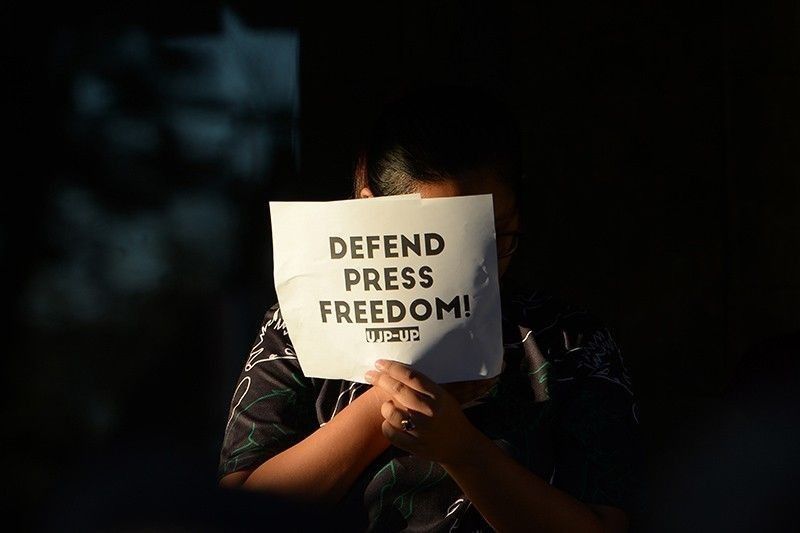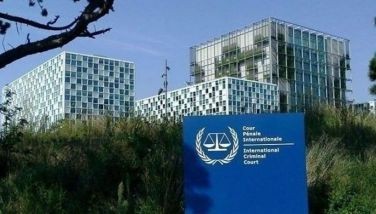Press groups record 128 cases of attacks vs media under Duterte admin

MANILA, Philippines — There have been 128 cases of attacks and threats against the Philippine press since President Rodrigo Duterte assumed office, according to a report of various media groups released during the observance of the World Press Freedom Day.
In a press briefing Friday, the Freedom for Media, Freedom for All Alliance said that 12 journalists have been killed between June 30, 2016 and April 30, 2019.
Aside from killings, the media groups also documented:
- 18 cases of online harassment
- 16 cases of intimidation
- 12 cases of threat by SMS
- 12 libel cases
- 10 cases of website attack
- 8 cases of journalists barred from coverage
- 8 cases of slay attempt
- 5 cases of verbal threat/assault
- 5 cases of physical assault
- 5 cases of arrest
- 5 cyber libel cases
- 3 cases of physical harassment
- 3 cases of corporate related issues
- 2 cases of bomb threat
- 2 cases of straffing/shooting
- 2 cases of article takedown
They noted there have been “big spikes” on the incidents of red-tagging, Distributed Denial of Service attacks and online harassment in the last six months. DDoS, according to the Electronic Frontier Foundation, “aims to make online resources temporarily or indefinitely unavailable by flooding them with so much traffic that their intended users cannot access or use them.
Luzon had the most number of attacks and threats against media workers with 89, followed by Mindanao with 26 and Visayas with 13.
The media watchdogs also identified alleged perpetrators of threats and attacks against Philippine press:
- 60 state agents
- 17 online trolls
- 17 private citizens
- 8 unknown attackers
- 4 unknown web attackers
- 2 metro tabloids
- 1 alleged member of New People’s Army
- 19 are still unidentified
The Philippines placed 134th out of 180 countries on the World Press Freedom Index of media watchdog Reporters Without Borders with a score of 43.91. In 2018, the country ranked 133rd.
In a statement, the National Union of Journalists of the Philippines stressed that more than any administration since the rule of late dictator of Ferdinand Marcos, Sr., “never have freedom of the press and of expression under siege as during the presidency of Rodrigo Duterte.”
“Never has any president, Marcos included, openly spearheaded the attacks and vilification of media. We have also seen how he and his minions wield the lie as a weapon against the profession of truth,” NUJP said.
‘Matrix club’
The journalists who were included in a diagram alleging that three media outlets and a group of pro bono lawyers are conspiring to boot Duterte out of office—dubbed as the “Matrix Club”— condemned the continuous attacks of the current administration against members of the media.
A diagram—released last week in an exclusive banner story of Manila Times and later that day in a press briefing at the Palace—alleged that the National Union of Peoples’ Lawyers, VERA Files, Philippine Center for Investigative Journalism and Rappler are plotting against Duterte and being linked to an anonymously posted video alleging the Dutertes are involved in illegal drugs.
Veteran journalist Inday Espina-Varona, who was tagged in the matrix as member of NUPL despite not being a lawyer, hit Duterte for his supposed strategy of spreading lies to muzzle critics.
“We actually don’t need to defend ourselves here because there is not a single clear data, accurate data in that report. Uulitin lang namin dito sa lahat ng Pilipino, hindi kami nagtataka na ang Duterte administration talaga ang kanyang strategy ay tumapon ng atake, ng kasinungalingan,” she said.
VERA Files president Ellen Tordesillas called the so-called matrix a “classic example of fake news” because it “was deliberately produced, manufactured.”
Presidential spokesperson Salvador Panelo admitted not knowing the source of the matrix Thursday. Last April 22, Panelo, who struggled to explain the diagram to Palace reporters, said the “source is the Office of the President. It’s from the president himself.”
READ: No proof of ouster plot a week after 'expose,' VERA Files points out
NPC slams so-called ‘foreign intrusion’
While other media organizations lamented the government’s supposed move to stifle journalists, the National Press Club said that “foreign funding” is a “far urgent and pressing problem that needs to be exposed and to be fought against.”
“Our press freedom and by extension, our democracy, is under siege and now in deep crisis not because of Malacañang and its alleged ‘repression’ of the press,” NPC said in a statement on the eve of World Press Freedom Day.
It added: “Philippine media is now in deep crisis because, some in our midst—unfortunately those who styled themselves as God’s gift to our profession—have wittingly and knowingly committed the worst form of corruption when they started accepting what amounts to as bribe money from foreign interests.”
NPC accused newsrooms who receive foreign funding of “bastardizing” the journalism profession.
“The result is a people divided, a government unable to focus on its job of good governance and a profession—our profession—fast losing its credibility and standing as a pillar of our democracy,” it said.
But Sheila Coronel, founding director of the PCIJ, wrote Thursday that getting foreign funding is not a crime. This was a response to Manila Times columnist Bobbi Tiglao, who said that US-funded media outfits should be shut down for somehow violating the Constitution.
“Raising funds from local foundations or business groups could be fraught because they are all tied to local political or business groups. Foreign funds can give more independence. That’s especially true when they explicitly – as with PCIJ – are not involved in editorial decisions; and even more so when the money is put into an endowment that they no longer have any control over.”
PCIJ executive director Malou Mangahas said the government does not like foreign funding but it receives support from foreign countries.
“Foreign funding [is] bad for media that’s critical of the Duterte administration but foreign funding [is] good for Presidential Communication Operations Office because it supports the administration. Foreign funding [is] bad for church groups, civil society organizations, business groups if you start criticizing the government but foreign funding [is] good for government under Build Build Build, scholarship programs, bridges, etc.,” Mangahas said.
Coronel noted that media agencies under PCOO such as PTV- 4, the Philippine News Agency, and Radyo ng Bayan, get foreign support.
“The Constitution bans foreign ownership of the media, but this isn’t ownership. It’s funding,” the academic dean of Columbia University’s Graduate School of Journalism said.
She also said: “We are even more concerned that by raising the foreign funding bogey to target PCIJ and other independent media, he is laying the groundwork for a crackdown on the press – and eventually, on civil society – based on emotive appeals about foreign interference that have zero grounding in fact. If the history of this country tells us anything, it is that freedoms are hard to win, but easy to lose.” — Gaea Katreena Cabico
- Latest
- Trending






























